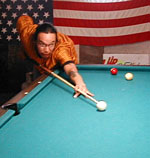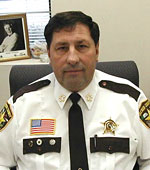|
Today, many American Indians live in two worlds. Off the reservation they are guaranteed all the rights of a U.S. citizen. On the reservation, those federal rights disappear, replaced by the Indian Civil Rights Act of 1968, enforced by tribal governments. Many Indian people in Minnesota and the Dakotas say they've come to expect injustice both on and off the reservation. Here are stories from some people who say their rights, and complaints, are ignored.
 |
John Rock, Jr. plays pool in his garage in a northern Minnesota community. He claims he is being harassed by a white neighbor, and the police department has not responded to his complaints.
(MPR Photo/Dan Gunderson)
Is there racial disparity in arrests? Look at the numbers.
|
THE STORIES BEGIN AS A TRICKLE.
But spend some time in Indian country, and they become a torrent. From tribal leaders to school children, attorneys to convicted criminals, they tell stories about being treated differently.
John Rock Jr. likes to spend evenings shooting pool with friends in his garage. Between shots he peers out the window, just checking, he says, for signs of the man he claims harasses him nearly every day. It started in a dispute over how snow was cleared from an alley. Rock says when he saw his neighbor making obscene gestures, he walked across the yard to confront him.
"And he goes, 'Get off my property, you f***ing prairie nigger.' And I said, 'F*** you.' I wasn't going to leave till we straightened this out," says Rock. "He hollered some more and called me more names - started teasing me, saying, 'You're going to jail, you f***ing half breed."
Rock says he challenged the man to a fight, but only words were exchanged, and police were called. Rock was charged with trespassing. He says the harassment continues, but he's not getting the help he wants from the police. He says he's complained directly to the chief of police.
"He told me to be a bigger man - to look the other way - and that he was going to look into it," says Rock.
Police say the case is ongoing. They deny Rock is treated differently than any other citizen. The neighbor did not respond to requests for an interview. John Rock has filed a complaint with the Minnesota Human Rights Department.
While John Rock says police ignored his complaints, many Indians say they
get too much attention from police. These people have all filed complaints with the human rights department, alleging police brutality.
 |
Becker County Sheriff Warren Rethwisch. "It's usually the one percent of the population that seems to have the problem with law enforcement, and probably why is they're involved in illegal activities. When they get caught, they're the first ones to scream they're being picked on," he says.
(MPR Photo/Bob Reha)
|
"He threw me on the car and he kept choking me."
"He tackled me and he put my hands behind my back, and he pulled my hair and he said, 'you're going to listen to me.'"
"He'll get out and tell us to put our hands up on the car. Otherwise he'll tell us to get in the cop car. Then he'll search us. Then he'll let us go."
"He threw me up on his police car and he slammed my face against the hood. I started bleeding right away and I turned my head, and he hit my head again."
In many cases such allegations by American Indians are dismissed as complaints of troublemakers.
Chances are slim their complaints will be investigated. Records show the Minnesota Human Rights Department investigates fewer than five percent of complaints filed by American Indians. Officials say the agency is hamstrung by a lack of resources, and often lacks jurisdiction.
County arrest statistics show in some northern Minnesota counties, American Indians are a minority of the population, but make up a majority of those arrested and jailed. Law enforcement officials say that simply reflects the fact that American Indians commit more of the crime.
Allegations against law enforcement for racial profiling or abuse are difficult to investigate. White Earth Tribal Judge Anita Fineday says complaints are so common, she's started collecting sworn affidavits.
"It's a class action lawsuit waiting to happen. There are clearly violations of federal law. Clearly, people are receiving law enforcement services based on the perceptions of some people as to whether they are Indian or non-indian," says Fineday.
"That's totally wrong - totally false," says Warren Rethwisch, sheriff of Becker County, which encompasses part of the White Earth reservation.
"It's usually the one percent of the population that seems to have the problem with law enforcement, and probably why is they're involved in illegal activities. When they get caught, they're the first ones to scream they're being picked on," says Rethwisch.
But Becker County Commissioner Carolyn Engebretson says she believes American Indians in her county are treated differently by law enforcement.
"Maybe we have to get sued a few times - maybe it's going to cost us some money. Maybe that's what its going to take, and I encourage people to do it," she says.
My parents, and their parents, and their parents, died waiting for fairness to happen. I don't know the mindset of a society that won't come back and fix things that have gone awry.
-White Earth Tribal Chairman Doyle Turner
|
Engebretson says she is troubled by the vast chasm that still seems to exist between white and Indian people in northern Minnesota. She vividly recalls a conversation she had while campaigning last fall near the reservation.
"One person actually suggested that we put barbed wire fences up and keep them inside. I said, 'that's a concentration camp - that's what you want?' It was just horrifying. I was sick to my stomach," says Engebretson.
While such jarring stories are not uncommon, many American Indians say the subtle daily incidents of racism - which violate no laws - take a greater toll.
"The thing that happens around here is - they act like you're invisible. They look down, or they look to the side," says Robert Shimek, and environmental activist who lives near Bemidji.
Shimek says every time he walks down the street, he's reminded he's an outcast. He recalls a day this winter when a white teenage girl crawled over a large snowbank rather than pass him in an alley. Shimek says he's come to accept such responses as a fact of life.
"Would it have done me any good to stop and tell her, 'You didn't have to do that. You don't have to be afraid of me. I'm ok.' Would it have done any good? I don't know," says Shimek.
Shimek says challenging such incidents can be risky. He says he was harassed and threatened after speaking out about racism in a local school.
There are everyday incidents reported in many schools - a young Indian student was told he must cut his hair to be on a sports team, although long hair has a powerful spiritual significance for American Indians.
Many Indian students say they are subjected to racial epithets in classrooms
and hallways.
One of the most volatile cases involves the University of North Dakota in Grand Forks. Indian students want the school to stop using the the Fighting Sioux nickname for sports teams. As a result of that debate, Indian students say they are harassed and threatened on a daily basis. The U.S. Education Department's Civil Rights Division is currently investigating those complaints.
 |
A poster which was hung at the University of North Dakota, opposing attempts to change the school's Fighting Sioux nickname.
(Photo courtesy of the UND Native American Center)
|
As students mill about the UND student union, an elder leads a group of nickname protesters in prayer. A white student walking by curses the group under his breath. When questioned, he hurries into the crowd. UND student Wastewin Young says she hears such comments every day. Her car has been vandalized, and she says she'll no longer walk across campus alone. But she takes a pragmatic view of the situation.
"Native American people are the largest minority group in North Dakota, and this is just like the Mississippi of the north. Right now we just have to put up with all these racist remarks, because we have to understand they're ignorant. they don't know any better," says Young.
Many American Indians don't share that attitude. Generations of bad land deals,
boarding schools, and racist comments lead many to alcohol, drugs and other
self destructive behavior.
Growing up on the White Earth Reservation, Doyle Turner saw the bitterness passed from generation to generation. He says he understands why. He believes his wife was recently a target of racial profiling in a traffic stop. But he says he's determined to avoid becoming bitter.
"My parents, and their parents, and their parents, died waiting for fairness to happen," says Turner. "I really don't know the mindset of a society that won't come back and fix things that have gone awry. That puzzles me. That makes me reach into places I don't want to go."
Turner says the solution is not angrily demanding justice, but educating young people and building tribal economic power.
He says change will not come quickly, but he's encouraged by a groundswell of young American Indians determined to seek the justice that eluded previous generations.
|